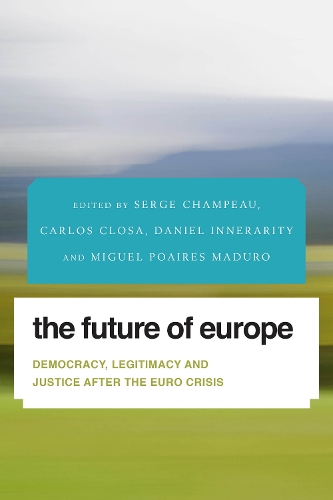
The Future of Europe: Democracy, Legitimacy and Justice After the Euro Crisis
(Hardback)
Available Formats
Publishing Details
The Future of Europe: Democracy, Legitimacy and Justice After the Euro Crisis
By (Author) Serge Champeau
Edited by Carlos Closa
Edited by Daniel Innerarity
Edited by Miguel Poiares Maduro
Bloomsbury Publishing PLC
Rowman & Littlefield International
7th November 2014
United Kingdom
Classifications
Professional and Scholarly
Non Fiction
341.2422
Physical Properties
Hardback
304
Width 159mm, Height 237mm, Spine 29mm
558g
Description
The European Union seems to have rescued its single currency, but it has not yet put an end to the crisis. In this major new book, a group of fifteen international philosophers, economists, political scientists, sociologists, and legal experts compare the economic, political, constitutional, social, and cultural interpretations of the European crisis. They describe the challenges the EU faces in relation to legitimacy and democracy and address head-on the uncertainty over the future of Europe. The book considers different possible scenariosfrom the Union's dissolution, with or without the continuation of the integration process, to its reinforcement through the building of a political union addressing the challenges of legitimacy, democracy and justice. Such a strengthened union could mark a new stage for democracynot the democracy of ancient cities and modern states, but one convenient to the complex entities, neither national nor supra-national, of which the European Union, despite the crisis, is still the best modern example.
Reviews
With such a distinguished cast of specialists from such a wide range of disciplines, it should come as no surprise that this is the best collection of essays yet on the twined crises of the Euro and the European Union. Strongly recommended, not just to those who want to understand what is happening, but also to those who wish to do something about it. -- Philippe C. Schmitter, Professor Emeritus, European University Institute
With outstanding contributors from right around Europe, this volume offers an exhaustive survey of current debates about the status of, and prospects for, the EU at a crucial point in its history. -- Professor Lord Anthony Giddens, London School of Economics
Author Bio
Serge Champeau is a researcher at the Spanish think tank, Globernance. He was previously a professor of philosophy at Bordeaux. He is the author of several books in French. Carlos Closa is professor of political science at the Institute for Public Goods and Policies (IPP) at the Spanish National Research Council (CSIC) and part-time professor and co-coordinator of research area at the Global Governance Programme, RSCAS at the European University Institute. Daniel Innerarity is professor of social and political philosophy at the University of the Basque Country, research professor at the Basque Foundation for Science (IKERBASQUE) and director of the Institute for Democratic Governance (Globernance). Miguel Poiares Maduro is professor of law at the European University Institute, Florence. In April 2013 he was appointed as Minister of Regional Development in the Portuguese government.
